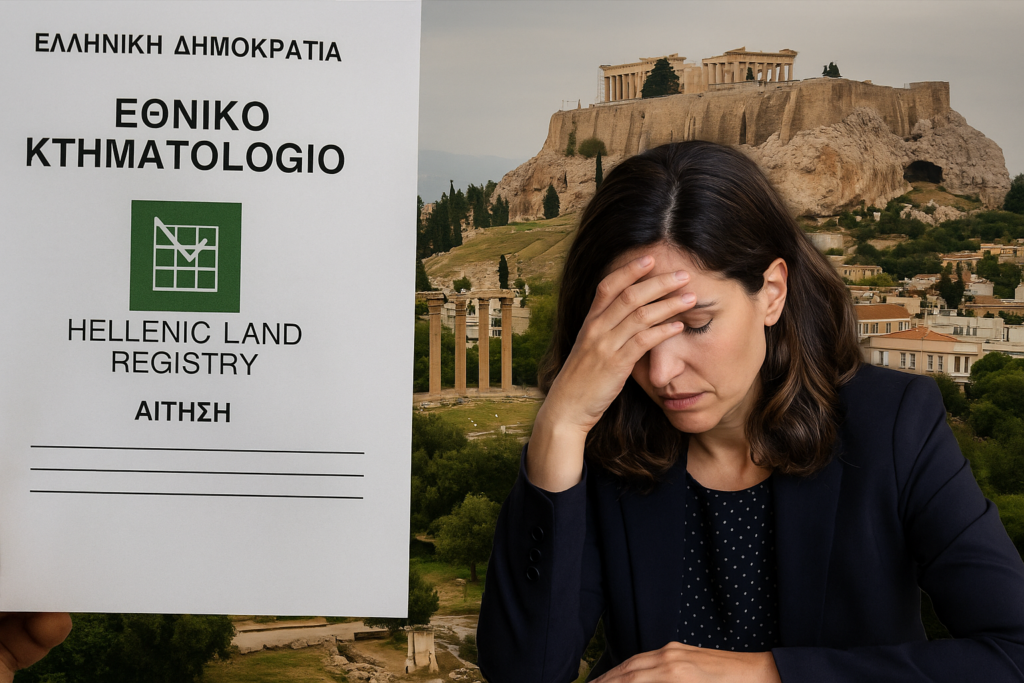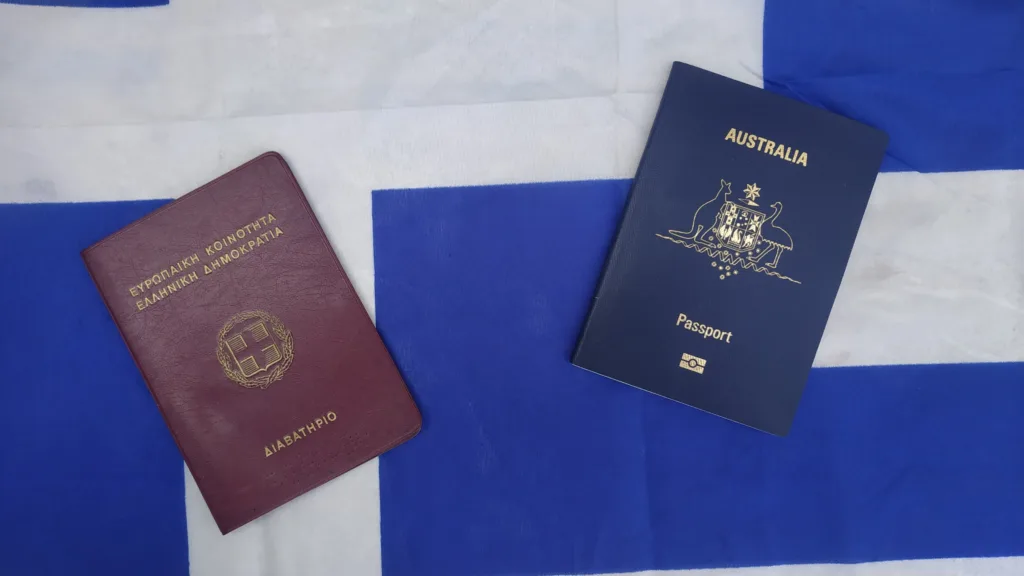By Ilias Karagiannis
The yearning for the homeland can quickly turn into a nightmare when a Greek living abroad comes face-to-face with Greece’s notorious bureaucracy. Inheritance delays, land registry deadlines, and documents rejected over a missing stamp or minor discrepancy often create a nightmarish reality. It’s a frustrating web of procedures that many Greek Australians struggle to navigate in order to manage their property affairs in Greece.
Greeks abroad, fuelled by love for their roots, often find themselves entangled in a labyrinth of processes that demand time, patience, and specialised knowledge.
In this labyrinth, lawyer Anastasia (Natasha) Karamichou emerges as a valuable ally. With academic qualifications in European Law and Business Administration, deep expertise in Civil, Inheritance and Immigration Law, and a personal connection to the Australian Greek community, she understands firsthand the challenges and questions troubling the diaspora.
The following interview serves as a practical guide for anyone wishing to preserve their ties to Greece — even when the legal hurdles seem insurmountable.
The Greek Herald has received numerous complaints from members of the Greek community who were informed either late or not at all about the deadlines concerning the Land Registry, causing concern and uncertainty regarding the fate of their property in Greece. So, what can a reader who has not yet taken any action do today?

The National Land Registry is a unified and constantly updated Information System which records legal, technical and other additional information on real estate and rights to it, under the responsibility and guarantee of the State. The “HELLENIC LAND REGISTRY” as a Legal Entity under Public Law, is responsible for the publicity of transactions in rem, taking over the overall maintenance of the National Land Registry System, which will gradually absorb all the Land Registry Offices of the country and merge with them.
Today, 59% of Greek Territory is officially registered. How does the land registration process start in a region? According to 2308/1995 Law, the Ministry’s decision to declare an area under land registration is posted in the relevant municipal or communal shops and published twice consecutively in two newspapers in the seat of the prefecture, if it exists, and in two daily Athenian newspapers and the Ministry of Foreign Affairs. In this way, Greek citizens are given the opportunity to describe in a declaration their rights over property they may own in the area under land registration.
Greeks living abroad have the right to submit the declaration within 6 months of the last publication of the decision. Therefore, the lack of correct and timely information on the submission of the declaration and the observance of the deadline has forced many Greeks living abroad to deal with procedures of objections to the properties under registration in the Land Registry and the filing of lawsuits for the recognition of their rights in areas where the land registration has been completed and the rights over properties have been finalized as “unknown owner” or in favor of the Greek State or even in cases where the land records are inaccurate and require correction.
In the latter two cases the time limit for filing a claim is 7 years for foreign residents. Contact and consultation with qualified professionals (Lawyers, Notaries, Surveyors) can provide solutions and guidance for the settlement of these cases, which by nature are time-consuming. Moreover, there is no one solution for every case. These cases’ monitoring depends on the geographical area, on the stages of the land survey, on the type of right to be registered, on the number of beneficiaries on the succession.
The process of recognising or acquiring Greek citizenship concerns many new generations of Greek Australians. The notorious Greek bureaucracy may discourage some from taking the necessary steps. What are the basic requirements, and which documents are typically difficult to get accepted by Greek authorities?
In Greece, the 4535/2020 law is currently in force for the acquisition of Greek citizenship. This law simplified the procedures for Greeks living abroad; however, there are some formal and substantive requirements:
- Application for the Greek citizenship acquisition of Greeks residing abroad at the Greek Consul of their place of residence.
- An application for the Greek citizenship acquisition to the Consul, in the presence of two Greek citizens as witnesses.
- Exact copy of a valid foreign passport or other proof of identity.
- Original of birth certificate legally certified and officially translated or another equivalent certificate (if applicable, an original certificate of baptism is accepted).
- Original criminal record certificate from a foreign authority legally certified and officially translated.

It is often observed that Greeks living abroad submit copies of certificates without proof of their accuracy and not the original copies or certificates that are not translated through the official translators of the Greek Ministry of Foreign Affairs and without the Hague seal (apostille). Such certificates are not accepted by the Greek authorities, resulting in applicants’ inconvenience and the process of acquiring the Greek citizenship being transformed from a joyful and optimistic process into a permanent struggle with the Greek State Authorities.
The essential requirements include sufficient knowledge of the Greek language, Greek history and geography, as well as family ties with a Greek citizen, familiarity with the customs and traditions of Greek society, participation in voluntary activities, social and religious events.
The field of inheritance matters is one of the common issues faced by Greeks in Australia. What should a member of the diaspora know if they wish to secure their property in Greece? Are there specific timeframes or legal pitfalls that require attention?
Greeks who lived for many years in another country, where they have developed professionally, have acquired property and their demanding daily life forces them to put the settlement of inheritance and property issues in their homeland on the back burner. As a result, wills (handwritten or secret) are drawn up for assets in Greece whose publication and acceptance by the heirs is delayed or forgotten. It is also noted that if the heir renounces the inheritance, he/she must submit the declaration of renunciation within 4 months from the date of death. If this period passes without action, then he/she is deemed by law to have accepted the inheritance and the declaration of acceptance of the inheritance, which is prepared by the Notary Public together with the preparation of a declaration for the payment of inheritance tax, must follow.
The time limit for filing the inheritance tax declaration generally starts from the death of the deceased for heirs intestate (without a will) or the publication of the will for testamentary heirs. It is also important to note that the acceptance of the inheritance requires the issuance of the ENFIA Certificate, which will certify that the deceased had submitted his/her E9 and paid the ENFIA for the last five years prior to his/her death. In these cases as well, seeking legal guidance in advance is considered essential, as it may protect heirs from acts or omissions in carrying out the necessary actions after the death of the deceased.
Let us not forget, however, the legal actions that can be taken during life, such as parental provision under Article 1509 of the Civil Code and the establishment of a gift (donation) during life to any third party for any real estate or an undivided share thereof, located within the Greek territory in full ownership, in part ownership or in usufruct.

As summer approaches, many Greeks abroad are preparing to visit the country and settle outstanding legal matters – from inheritance issues to property transfers or citizenship cases. What should they have gathered in advance in order to speed up the process and make the most of their time in Greece?
Every legal case, whether it concerns inheritance law, nationality (citizenship) law or real estate transactions, is different. Advance consultation with an informed lawyer is essential and saves the parties concerned from hassle, delay and unnecessary expenses. Since Greek living abroad stay in Greece for a short period of time, including well deserved summer holidays, the power of attorney to the Lawyer or another trusted person, but always in consultation with a Lawyer, is of foremost importance. Most of the legal actions that will be initiated during summer months will almost certainly not be completed when they leave Greece. Therefore, the accurate drafting of a Power of Attorney either by the Consular Authority or by a Greek Notary Public protects and relieves them from actions that will definitely concern and trouble them, while dealing with the Greek State, National Authorities and Organizations.
Moreover, the contact and consultation with the local Consular Authority is critical, because this Authority will issue the required documents and certificates (exact copies, officially translated certificates) that the Greeks living abroad could bring with them to Greece upon their arrival, but I repeat, that each case is individualized, so the uninterrupted and continuous communication with their Attorney in Greece is of major importance.
You’ve worked with many Greeks living abroad – what is the most common misunderstanding or expectation you encounter when someone from the diaspora engages with Greece’s legal reality?
I feel fortunate, because apart from clients, I have friends like family to me and business associates in Australia, which I visited and admire. I receive the same frustration and bitterness from all of them when their legal cases in Greece are not completed in the anticipated time, with the expected diligence, with errors and omissions by public services and other administrative authorities. However, conditions in Greece today are not the same as they were 30 years ago.
I am not claiming that the Greek Public Administration operates like a “Swiss watch”, but I do believe that many steps have been taken towards modernization, computerization, simplification and acceleration of procedures that the Greeks in Australia are rightly unaware of. Patience, focus and cooperation are recommended. Many times, the supporting documents we have may not be sufficient or correct for the legal transaction we will perform, nor can we complete within a short period of time legal cases that in Greece “take time”. Therefore, contacting professionals in Greece (Lawyers, Notaries, Accountants, Surveyors) who are familiar with the newest Legislation, online platforms and trained to investigate with accuracy, using the appropriate tools is beneficial and “comforting”.
For more information on issues that concern you, you can contact Anastasia (Natasha) Karamichou at the following phone numbers: +30 2106139625, +30 6942472539 or via email: n.karamichou2012@gmail.com

